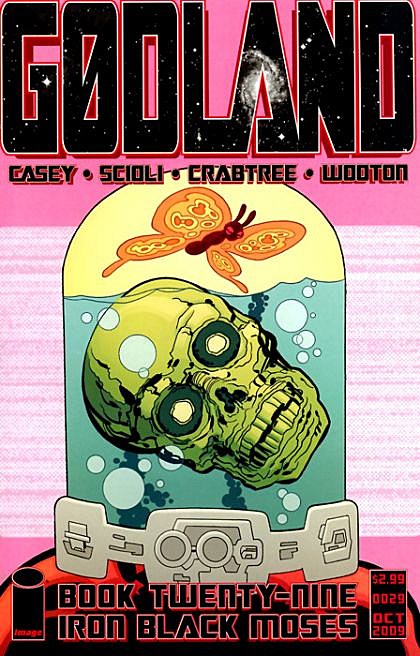
‘Vengeance’ and Anarchy: The Agitprop Comics of Joe Casey

The Marvel Universe unleashed Vengeance last week: a six-issue limited series by Joe Casey and Nick Dragotta that promises to violate readers in all manner of improbable ways. It's a high-energy, high-impact trip into what Casey has called "the anarchy of youth" in the Marvel Universe. And I think we can all agree, there's no better writer to handle it.
In a career that has spanned a little over a decade, Joe Casey has written dozens of titles for both major publishers, including Adventures of Superman and Uncanny X-Men, all while maintaining a steady stream of dangerously forward-thinking creator-owned comics like Automatic Kafka and Godland that have explored youth culture, the American identity, rebellion, and anarchy. Forget Bullseye -- Joe Casey's the most dangerous man in comics.Joe Casey doesn't need comics. As one-fourth of Man of Action, Casey, Duncan Rouleau, Steven Seagle, and Joe Kelly parse out royalties from their animated television show Ben 10. That includes all the cartoon series, the upcoming game show, several hundred million units of merchandise including toys, video games, and of course, underoos. I don't pretend to know an exact figure, but I think we can agree that MOA be ballin'. Joe Casey doesn't need to slog out ninety-six pages of comics a month to secure a good living for himself or his family; he writes comics because he wants to, because he feels like it, despite knowing how poorly it will likely sell.
 Casey's books don't sell for a simple reason: the more daring, creative, and unconventional a superhero book is, the less likely it is to movie issues. And almost everything Casey writes is daring, creative, and unconventional, to the point where one has to wonder if he even wants anybody to buy it. He spits in the face of trends and status quo, and does whatever he wants, and he's so damn good that it turns out to be not what comics readers always want, but what they actually need.
Casey's books don't sell for a simple reason: the more daring, creative, and unconventional a superhero book is, the less likely it is to movie issues. And almost everything Casey writes is daring, creative, and unconventional, to the point where one has to wonder if he even wants anybody to buy it. He spits in the face of trends and status quo, and does whatever he wants, and he's so damn good that it turns out to be not what comics readers always want, but what they actually need.
Okay, maybe we don't exactly need Marijuanaman, but over the years Casey has knocked out several books that will remain classics on too few readers' shelves. And he's defied convention at just about every turn. After cutting his teeth on a Cable run in the late '90s that continues to affect the way the character is portrayed, he went on to pick up The Incredible Hulk after Peter David's finished fifteen years on the title, and somehow got Steve Rude to illustrate his X-Men: Children of the Atom. That was all within a couple years of his debut. In the early 2000s things really picked up, and he churned out several stories that are just now getting the recognition they deserve, and since then his best works have all provided some of the snappiest dialogue, most interesting villains, and the most aggressive, confrontational ideas in comics.
WildC.A.T.S. is probably Casey's first great book. When he and artist Sean Phillips assumed control of the second volume of Jim Lee's first-born, they successfully re-shaped the leftovers of a vapid action book with a lackluster Alan Moore run into the smartest, coolest book on the stands. By focusing on HALO corporation and the artificial being Jack Marlowe/Spartan, he explored dangerous ideas like the inefficacy and corruption of government, the gruesome and vampiric realities of a free-market economy, the ambiguity and pragmatism of intent and outcome. As Jack Marlowe, Spartan and his perfect brain sliced through the bullsh*t of the system to make the world a better place, even as he was perceived as a villain by his own team-mates. Now in new trade collections, WildC.A.T.S. volumes two and three are gems of style and ideology that are still ahead of the curve ten years later.
 Automatic Kafka remains Casey's most out-there, experimental, and unappreciated work. Illustrated by the unpredictable Australian artist Ashley Wood, AK got in readers' faces and confronted them with a bizarre permutation of the superhero raised on Hustler and smack, a comic book about comic books that simultaneously skewered and revered all the conventions of the genre. The amped-up beauty and grotesqueness of celebrity and sex and drugs and violence and commercialism in America shotgunned at the reader by self-aware characters, including an altruistic former villain with a universe for a head.
Automatic Kafka remains Casey's most out-there, experimental, and unappreciated work. Illustrated by the unpredictable Australian artist Ashley Wood, AK got in readers' faces and confronted them with a bizarre permutation of the superhero raised on Hustler and smack, a comic book about comic books that simultaneously skewered and revered all the conventions of the genre. The amped-up beauty and grotesqueness of celebrity and sex and drugs and violence and commercialism in America shotgunned at the reader by self-aware characters, including an altruistic former villain with a universe for a head.
Originally pitched as a Doom Patrol series, Automatic Kafka attacked the average superhero fan's sensibilities while mystifying more adventurous readers with the abundance of craft and innovation on display. Way back when I used to hang out on the Delphi boards, Matt Fraction remarked that he hadn't felt that excited by a comic since Grant Morrison's Doom Patrol, and you can clearly see the imprints of AK on Casanova. Unfortunately, it didn't sell like Casanova, and only made it to issue nine. Automatic Kafka wasn't built to last, but while it did it blew the doors off of everything on the strip.
Casey has always tried to manage a balance between personal works of artistic expression and crowd-pleasing commercial work on the big properties. Among his big superhero works, Adventures of Superman #613-624 may be Casey's most personal take on a licensed character. It's definitely the most controversial. When Casey got himself a one-year contract, he set out with a bold idea -- Superman couldn't throw a punch for a whole year. Readers subjected to the initial run on Superman: Grounded might feel a hint of bile coming up at the thought of any year-long, humanizing story arcs, but Casey's year-long take on Superman remains one of the most fascinating in recent memory.
By pacifying Superman and bringing Clark Kent the journalist into focus, Casey resurrected the socialist Superman of the earliest Siegel-Shuster stories. Casey made a stop at all the ports on the ideological tour -- commerce, government, comics, the value of defiance, even a love-letter to the original weirdo Alvin Schwartz -- but all in the guise of an all-ages mainstream superhero comic. Energetic, inventive, and cunningly subversive, Casey's run remains an influence on several writers who followed, including Grant Morrison. If you've noticed anything of a trend, it shouldn't surprise you that it didn't sell that well. As such, it's never been collected.

There's something about Casey's work that just seems to make readers uneasy. Sure, they love him when he plays it pretty straight, on blockbusters like The Avengers: Earth's Mightiest Mortals. Anytime he writes an untold story in the early years of a superteam, they're in and loving it. But when he really tries to make the reader think, to throw them out of their comfort zone, they're just not interested. As I said, though, it doesn't matter anymore. Casey can do whatever he wants now. And medium-sized as it is, his following is a smart and loyal one, ready to go with him in search of something better than comfort. The sly, mind-boiling villainy of anarchy juiced to 11 in Dark Reign: Zodiac; the multicolored entropy and ecstasy of Godland; the sex and chaos of Butcher Baker; the teenage acid riot of Vengeance and whatever else Casey wants to do.
Joe Casey doesn't need comics. Comics need him.
More From ComicsAlliance
![All The Image Comics Announcements From Emerald City Comic Con [ECCC ’17]](http://townsquare.media/site/622/files/2017/03/Image-Featured.png?w=980&q=75)

![Lion Forge Comics Announces New Superhero Universe And Young Reader Imprint [NYCC 2016]](http://townsquare.media/site/622/files/2016/10/Lion-Forge-Feat.jpg?w=980&q=75)
![Finally, A Solo Series For Miss America… Vasquez? [SDCC 2016]](http://townsquare.media/site/622/files/2016/07/America.jpg?w=980&q=75)

![‘Miami Vice Remix’ #3 Features Zombies On Bath Salts, Disco Psychosis, And The Godfather Of Soul [Preview]](http://townsquare.media/site/622/files/2015/05/Remix00.jpg?w=980&q=75)



